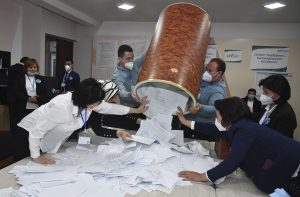Congratulations began to roll in for Uzbek President Shavkat Mirziyoyev’s reelection before the preliminary results of this weekend’s vote were announced. The presidents of Belarus and Russia — Alexander Lukashenko and Vladimir Putin — appeared to convey congratulations to Mirziyoyev ahead of the public announcement that the incumbent had secured a second term with 80.1 percent of the vote.
The OSCE Office for Democratic Institutions and Human Rights (ODIHR) observation mission’s preliminary findings stated that “recent reforms, which have gradually introduced welcome improvements, have not yet resulted in a genuinely pluralistic environment.” The OSCE also cited “significant procedural irregularities” including ballot box stuffing and failure to follow counting procedures.
The OSCE noted that there was “no meaningful engagement” between candidates and that the candidates “refrained from challenging or criticizing the incumbent.”
Meanwhile, despite the growth of the Uzbek media in recent years, “the space for citizens to freely and fully express their opinion remains controlled.”
The OSCE pointed to “cases of pre-trial detention, intimidation and harassment of journalists and bloggers” as contributing to self-censorship and limiting the information available to the public.
In footnotes, the report cites the cases of Otabek Sattoriy, a blogger who focused on local corruption and was jailed for 6.5 years on extortion charges earlier this year, and Miraziz Bazarov, who advocated for LGBTQ rights and, after being assaulted earlier this year, has been under house arrest and effectively silenced.
The OSCE also noted the “established practice of blocking websites” as further limiting access to information and the ability of Uzbeks to express their opinions.
Starting in the summer, users in Uzbekistan of a variety of social media platforms — Twitter, TikTok, VKontakte, and Skype — reported the sites being blocked. The state communications regulator, UzKomNazorat, said in July that the platforms had failed to comply with a January 2021 data protection law that mandated that internet services store Uzbek user data on servers in Uzbekistan.
The Uzbek presidential election campaign period was notably sleepy, in contrast with the parliamentary election of 2019, which, while yielding an expected result, at least featured public debates between the five legally registered parties.
According to the preliminary results released by the Central Election Commission, turnout hit 80.4 percent. In February, Uzbekistan decided to move its presidential election forward from December to October, ostensibly to present better conditions for voters and observers alike.
At the time, some critics, as RFE/RL reported, had suggested “the true reason for the proposal was because December is when the government usually comes under harsh criticism over its continual poor handling of meeting heating needs as winter clamps down on the country.”
Whatever the reason, the weather was fine but the political climate was poor. As has been noted repeatedly, in these pages and elsewhere, since the 2016 death of Uzbekistan’s first president, Islam Karimov, the country has undertaken a reform program under Mirziyoyev’s leadership. Economic reforms under Mirziyoyev, such as currency reform, were welcomed and seen as effective. Efforts to address the remaining forced labor issues were also widely welcomed, despite lingering problems. Even before the COVID-19 pandemic, however, political and social reforms remained the least advanced. No new parties were allowed to register to contest the election and independent candidates are not permitted by Uzbekistan’s election laws.
Ultimately, as several regional analysts noted in an event hosted by the Carnegie Endowment for International Peace last week, the pandemic seemed to have a cooling effect on the reform program writ large, stalling political reform efforts entirely. The introduction of new restrictions marked a reversal. For example, in April 2021 the state enacted a new law criminalizing insulting the president online rather than decriminalizing defamation.
In the end, Uzbekistan’s presidential election was another standard Uzbek presidential election. Absent real alternatives, the incumbent achieved a crushing victory. While Mirziyoyev’s vote share (80.1 percent according to preliminary results) fell compared to his 2019 election (in which he won 90.29 percent of the vote), the competition was far behind.
Maksuda Varisova, the only woman running, from the People’s Democratic Party received 6.6 percent; Alisher Qodirov from Milliy Tiklanish party took 5.5 percent; Narzulla Oblomuradov from the Ecological Party got 4.1 percent; and Bakhrom Abdukhalimov from Adolat secured 3.4 percent.
The next presidential election will take place in 2026 and according to the current Uzbek Constitution Mirziyoyev will not be eligible to run. Karimov solved that problem by arguing that his first term, under a previous constitution, did not count.
































